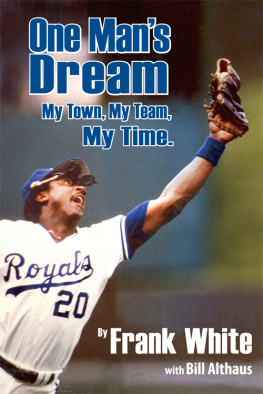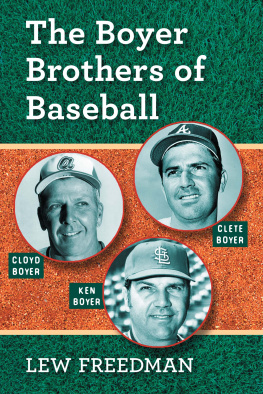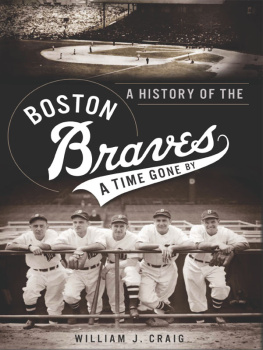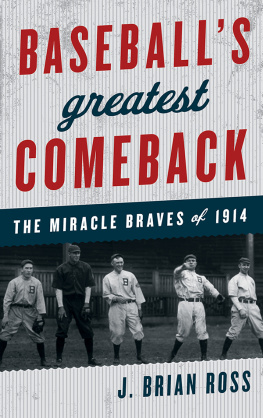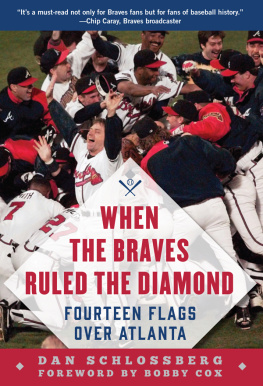Copyright 2006 by John Schuerholz
All rights reserved.
All photos are from the authors personal collection.
Warner Books
Time Warner Book Group
Hachette Book Group, 237 Park Avenue, New York, NY 10017,
Visit our Web site at www.HachetteBookGroup.com.
First eBook Edition: April 2006
The Warner Books name and logo are trademarks of Hachette Book Group, Inc.
ISBN: 978-0-446-55417-6
Book design by Charles Sutherland
In honor and in memory of my dad, John, a special athlete, a true gentleman, a kind and caring father, and my lifes mentor. To my mother, Maryne, the sweetest person, my wonderful Mud. And most especially to my loving wife, Karen, my constant bedrock of support and the real General Manager of our family and home. To our children, Gina, a caring daughter and dedicated teacher, and Jonathan, professional baseball player, a remarkable young man, and great son. They make me proud to be their son, husband, and father. They have made this journey joyful.
Larry Guest: Friend and author who first suggested this book idea to me in 1991 and whose collaboration helped me turn forty years of baseball memories and leadership values into these words. Thanks to his tireless efforts and literary guiding hand throughout our partnership in this project, Larry helped make this writing challenge a labor of love.
Larry Kirshbaum, Time Warner Book Group: Without your vision and strong belief in this book, it wouldnt have happened. Thank you.
Rick Wolff: My editor, whose knowledge, understanding, and appreciation of baseballs unique twists and turns and his attention to excellence in editing detail kept this project on track and always aimed high.
Karen: My loving wife, at-home collaborator, and editor. Her understanding of my thoughts and the core-deep instincts of my ideas helped me keep those values on these pages expressed in an appropriate style and fashion. Your support in this project was special.
Lou Gorman: Thanks so much. You gave me my start in baseball and, most importantly, a greater appreciation of our most precious asset in life: good people.
Frank Cashen, former president of the Baltimore Orioles: For answering my letter of hope to the Baltimore Orioles in 1966 and opening the door to my baseball career and lifetime dream.
Pastor Dr. Robert Sims, senior pastor, Lutheran Church of the Redeemer: Your spiritual inspiration and intellectual stimulation have not only greatly strengthened my personal values but have enhanced and inspired my professional leadership principles. Your words and your spirit have not only lifted me but found their way in my thoughts and words in this book.
Terry McGuirk, chairman and president of the Atlanta Braves: Your unbridled confidence and ongoing support continue to give me the encouragement and drive to lead this proud Braves franchise and the spirit to work and perpetuate its greatness.
Stan Kasten, former president of the Atlanta Braves: What an exhilarating and exciting time we had as we partnered in the remarkable transformation of the Braves. Ideas and sparks flew wildlyand now the championship pennants fly proudly. What a great ride we had. Thanks.
Bobby Cox, Braves manager: Our future Hall of Fame manager and my constant partner in this remarkable, unprecedented, proud run of success. It has been my great personal and professionl pleasure to serve as GM with one of baseballs all-time great managers.
Frank Wren, Dean Taylor, and Chuck LaMar: My assistant GMs in whose judgment I relied and on whose commitment, hard work, and loyalty I have always depended.
Paul Snyder and Dayton Moore: Paul, for your lifetime of passion and dedicated work in scouting on behalf of the Atlanta Braves and the honor and dignity youve added to baseball; and Dayton, for perpetuating those same values and the work ethic that keeps the Atlanta Braves talent pipeline filled with quality.
Melissa Stone: My executive assistant who not only manages my office but so willingly gave her time to coordinate the many aspects of this book project and still managed to give birth to her first child, Bradley. What a gal.
June Cornillaud: My first executive assistant with the Braves, who was so invaluable in guiding me through the organizations infrastructure in those early, crazy days, and always offered her strong opinions and even stronger loyalty.
Bob Costas: A man whos earned considerable accolades in sports journalism and whose remarkable knowledge of baseball is only exceeded by his passion for it. I am so honored that you were gracious enough to write the foreword for this book.
Jerry and Larry Schuerholz: My brothers, who always bring to mind the unmatched joy of a wonderful family life and the beautiful memories we share from it.
Bob Barnett: My literary agent, who marked the trail for my first steps along this challenging and exciting journey. Your guidance and assistance in this project started me in the right direction.
The Sand Iron 5: My good friends Nick Trigony, Bob OLeary, Bud Wright, Ed Mellett, and Mike Franke, for their constant friendship, golfing camaraderie, always honest opinions, and creative suggestions for the title of this book.
Rich Levin, Brad Hainje, and Dean Vogelaar: Three public relations pros, from Major League Baseball, the Atlanta Braves, and the Kansas City Royals, whose research and confirmation of facts were of great help.
by Bob Costas
In the fall of 1990, the Atlanta Braves were concluding a seventh straight losing year and a third consecutive last-place finish in their division. After the season John Schuerholz took over as the teams general manager, displacing Bobby Cox, who returned to field managing. Schuerholz got to work quickly, making a flurry of off-season moves. Every October since, when baseball has been played, the Braves have been playing it as a first-place team. Really, the story is that simple, and that extraordinary.
That year, you wouldnt have thought that a thirty-year-old accomplished, but not superstar, third baseman named Terry Pendleton would have an MVP season, but then again, youre not John Schuerholz. Pendleton was just the first in a long line of veteran free agents or trade acquisitions to restart or jump-start their careers in Atlanta: Marquis Grissom, Fred McGriff, Brian Jordan, Denny Neagle, John Burkett. Alongside them would be a never-ending stream of talented young players from the Braves system: Tom Glavine, David Justice, Chipper Jones, Javy Lopez, Andruw Jones, the list goes on. The pattern continues today. Who but Schuerholz and the Braves would continue to get good use out of forty-seven-year-old Julio Franco at the very same time that Jeff Francoeur makes the leap from Double-A to big league rookie sensation? These are but a few examples, and they are not isolated. Any team will catch lightning in a bottle with player moves now and then. But for Schuerholz and the Braves, this is an unending pattern, a pattern of shrewd and resourceful player evaluation and consistently effective cost-benefit analysis. This perennial first-place team has in many ways taken on the identity of its GM, universally admired for an excellence that is reliable and hard earned, as well as largely understated.
Its the sustained nature of that success that best defines the Schuerholz era in Atlanta. In a time of upheaval and constant change in sports in general, and baseball in particular, one of the precious few consistent things has been the uninterrupted excellence of the Braves. Now, certainly the club is not among baseballs have-nots, but the front office most definitely operates under a defined budget that has actually become significantly tighter in recent years. So they cant go off the deep end, and they have had to let the Glavines, Madduxes, Millwoods, Sheffields, and others go. Yet Schuerholz and the Braves always seem to find the replacement parts, either through an advantageous deal, well-considered free-agent acquisition, or the always well-stocked farm system. And then theres the Schuerholz application of the Branch Rickey philosophy of addition by subtraction. Few teams have displayed such a well-developed knack of getting a decent season or two out of a guy and then unloading him, just as his price was about to go up and his performance about to go down. This often frees up the payroll space the Braves need to keep their run going.



